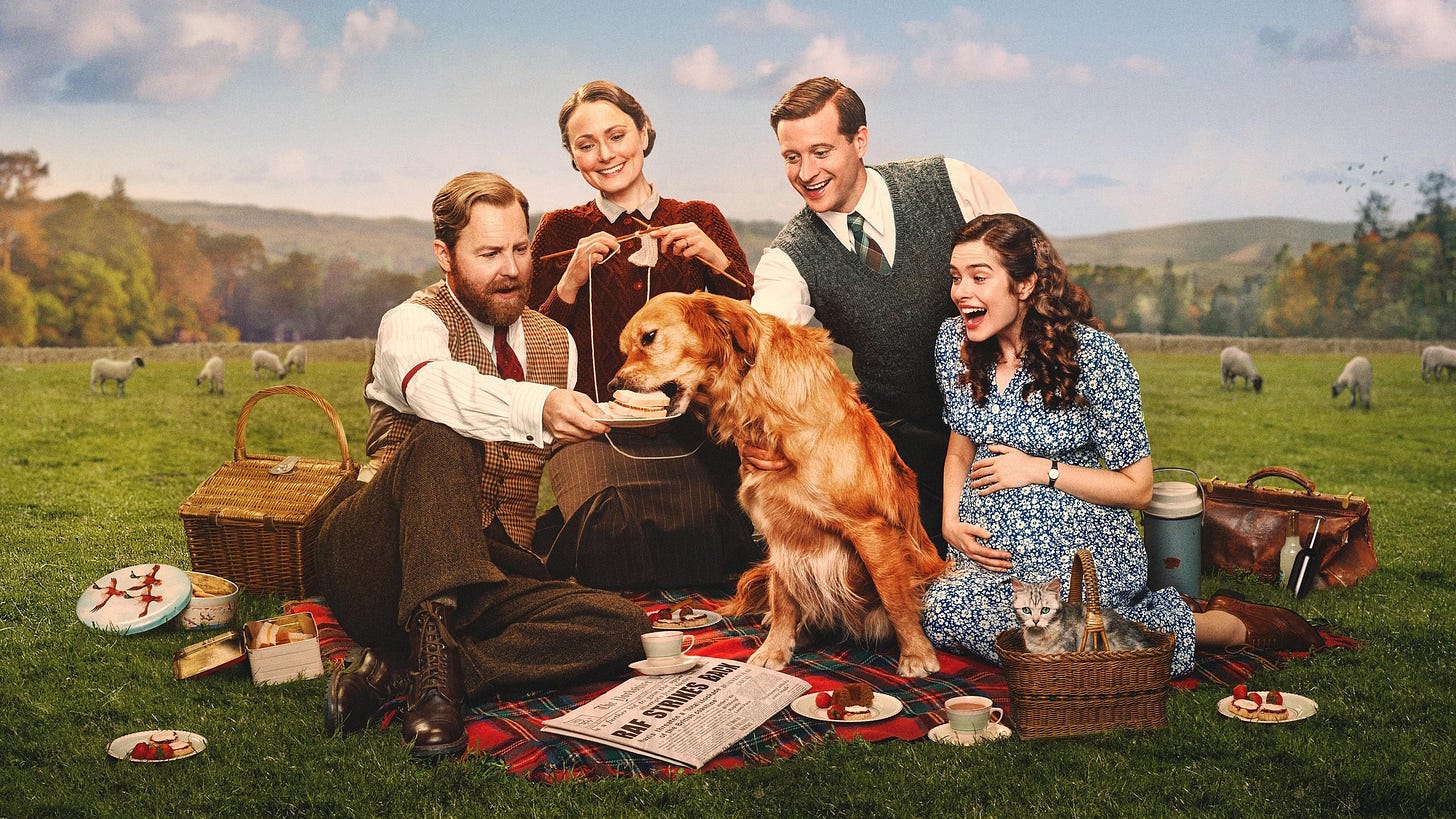Why You Should Watch 'All Creatures Great and Small'
What you need to know about PBS's delightful new James Herriot adaption
For the past several years, we have found a Sunday evening escape from the winter doldrums in the verdant Yorkshire Dales. All Creatures Great And Small (PBS, 9PM Sunday) is loosely based on the memoirs of James Herriot, a young Scotsman who moved to a small Yorkshire town to join a rural veterinary practice in the 1930s, and never left. The show, which debuted in 2020 and is about to wrap its fifth season, is a celebration of family life and true wonder at God’s creation.
All Creatures is centered on the residents of Skeldale House, the headquarters of a veterinary practice in the fictional Yorkshire town of Darrowby. The residents include Herriot (played by James Ralph); his wife, Helen (Rachel Shenton); Seigfried Farnon, his senior partner (Samuel West); Siegfried’s younger brother, Tristan (Callum Woodhouse); and Mrs. Hall (Anna Madeley), the housekeeper. These characters, brought together by a combination of personal and professional circumstances, artfully depict the challenges as well as the joys of family life.
Devotees of the original James Herriot books, consisting of a bestselling 4-part series and a children’s treasury, may object to the liberties the series takes with its source material. As we have largely been introduced to the story through the show, we have no such qualms. Indeed, we think the changes build on the books by giving greater depth to the women of Skeldale House. For example, the character of Mrs. Hall has been notably enlarged for the show, to great effect. Mrs. Hall is esteemed for her own intelligence, emotional and otherwise, among a household of men with professional degrees and (occasionally) difficult personalities. In the pilot, Mrs. Hall arranges for James to interview with Seigfried as an assistant to his bustling veterinary practice. Seigfried, brilliant but cantankerous, and still recovering emotionally from the passing of his wife, is unwilling to admit that he needs the help. But Mrs. Hall sees his true needs and nudges things in the right direction. Her keen perception often saves the day, but never at the expense of her male counterparts. While there is often humor in Seigfried’s blustering and bravado, he and the other male vets are not played as helpless dopes. Rather, as in any family, the essential complementarity of women and men shines in this show.
Much of the relational drama in All Creatures is about male friendship and brotherhood, and the show’s treatment of these relationships is refreshing. The men work together, live together, disagree about their work (often by shouting), and then share a pint (or two, or more) at the pub afterwards. Most episodes end with a warm scene around the dinner table, which underscores the familial atmosphere of the show and the way Mrs. Hall serves as a mother figure for all, not in the least by bringing everyone together for a meal.
Although religion is not an explicit topic of the show, All Creatures approaches the religious faith of its characters in a subtle and respectful way. The importance of faith is felt at pivotal moments in the series, like James and Helen’s wedding and the christening of their son. And like any good British television program, each series concludes with a heartwarming and festive Christmas special.
The rolling meadows of the Yorkshire Dales, best viewed from Siegfried’s racing green Rover 75 saloon, certainly get the most attention in PBS’s promotion of All Creatures. But the show’s interiors are also integral to its charm. Skeldale House radiates coziness with its golden walls and bright green woodwork. These spaces are so integral to the characters and their personalities—Siegfried’s messy desk, Mrs. Hall’s colorful kitchen, Herriot’s lofted bedroom high above the bustle of the house, the hallway nook where late night calls arrive—that they are characters in themselves.
We are not a pet-owning family and likely never will be. We don’t live in the countryside or aspire to own livestock. Yet All Creatures’ animal dramas rarely fail to move us. Every time animal birth is depicted in the show the witnesses respond with visible emotion at the wonder of new life. Seigfried often reminds his junior vets that their work is never only about the animals; neither is this show. The series treats the owners of these animals with great dignity. Some are hardworking farm families at risk of losing their livelihood if their herd cannot be saved. Others are pet owners whose attachment is affection, rather than function. Mrs. Pumphery (Diana Rigg/Patricia Hodge), a wealthy widow who lives in a Downton Abbey-esque estate outside the village, treats her Pekingese, Tricki Woo, like a spoiled child. But to the show’s great credit, nobody is one dimensional. Mrs. Pumphrey may be silly about her dog, but she proves herself to be capable of great sacrifice and empathy.
The show’s title takes its name from a hymn our four-year-old daughter loves to sing, “All Things Bright and Beautiful:
All things bright and beautiful, all creatures great and small, all things wise and wonderful: the Lord God made them all… God gave us eyes to see them, and lips that we might tell how great is God Almighty, who has made all things well.
Herriot drew the titles for each of his books from this hymn, and the last line exemplifies what Herriot did in his storytelling. By describing the good, true and beautiful that he saw in the created world, Herriot invited his readers to observe and wonder at these simple beauties for themselves. We are often so rushed, so quick to look down instead of out. In his wonderful book Four Seasons in Rome, Anthony Doerr notes: “We need habit to get through the day, to get to work, to feed our children. But habit is dangerous, too. The act of seeing can quickly become unconscious, and automatic…complexities wane, miracles become unremarkable, pretty soon we’re gazing at our lives as if through a burlap sack.”
All Creatures may be dismissed by some as “escapism.” But the world it transports us to takes a magnifying glass to the small moments of domesticity and nature that we would do well to pay more attention to. As St. Paul exhorts us: “Whatever is true, whatever is honorable, whatever is just, whatever is pure, whatever is lovely, whatever is gracious, if there is any excellence, if there is anything worthy of praise, think about these things.” (Philippians 4:8). While enormously indebted to Herriot’s original text, All Creatures has made a beautiful contribution to Herriot’s story that stands on its own.









Brava Megan! You reflect my sentiments exactly. I have been consistently delighted and impressed by this show and am amazed at how universally it is beloved. I have yet to meet someone who did not like it.
I love this so much and really want to watch this now!! Is it available anywhere for streaming, or DVD loan or purchase? I’ll have to look into it...